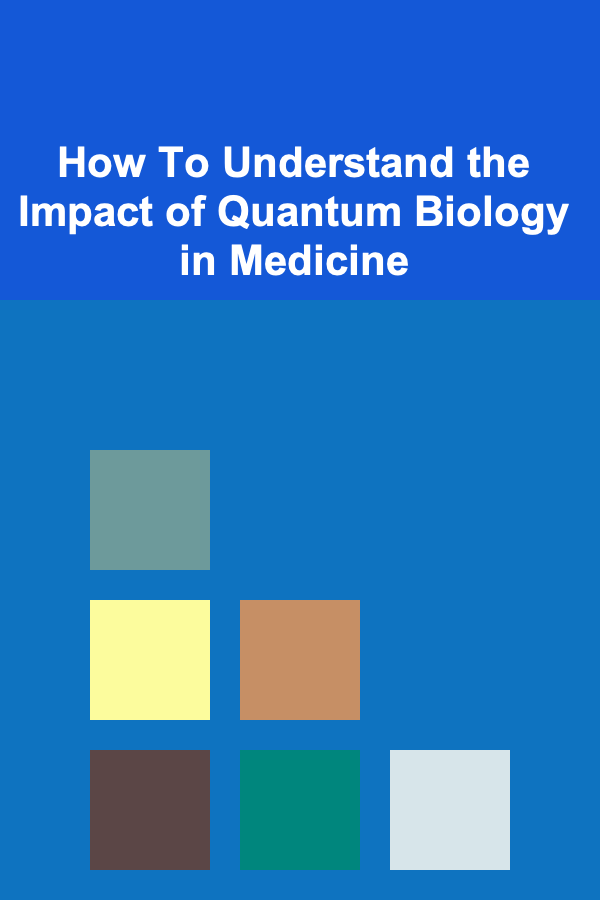
How To Understand the Impact of Quantum Biology in Medicine
ebook include PDF & Audio bundle (Micro Guide)
$12.99$10.99
Limited Time Offer! Order within the next:

Quantum biology is an emerging field at the intersection of quantum mechanics and biology, exploring how quantum phenomena, typically observed in the microscopic realm, influence biological processes. While quantum mechanics has been a cornerstone of physics for over a century, its application to biology is relatively new, and its potential to revolutionize medicine is profound. Understanding the role of quantum phenomena in living organisms opens up new frontiers in our quest for treatments for diseases, better diagnostic tools, and a deeper understanding of the fundamental processes of life.
This article aims to unpack the intricacies of quantum biology and its impact on medicine, from the basics of quantum mechanics to its practical applications in healthcare. Through an in-depth exploration of recent advancements and scientific hypotheses, we will illustrate how quantum mechanics could reshape the future of medical science.
The Basics of Quantum Mechanics
At the core of quantum biology lies quantum mechanics, the branch of physics that deals with the behavior of particles at extremely small scales. Quantum mechanics departs from classical physics by introducing concepts such as wave-particle duality, superposition, and entanglement.
- Wave-Particle Duality: In quantum mechanics, particles can exhibit both wave-like and particle-like properties depending on how they are observed. This behavior challenges classical concepts of matter and energy.
- Superposition: Quantum particles can exist in multiple states simultaneously. It is only when they are measured that they 'collapse' into one state, a phenomenon famously illustrated by Schrödinger's cat paradox.
- Entanglement: This is the phenomenon where particles become interconnected, such that the state of one particle instantaneously affects the state of another, no matter how far apart they are.
While these phenomena may seem abstract or irrelevant to biology at first glance, it turns out that many biological processes rely on quantum effects to function efficiently.
Quantum Mechanics Meets Biology: Quantum Biology
Quantum biology explores how quantum phenomena might influence biological processes like photosynthesis, enzyme reactions, and even the processes in our brain. While traditionally these phenomena have been regarded as separate, with biology operating according to classical laws of physics, the advent of quantum biology challenges that view.
Quantum Effects in Photosynthesis
One of the earliest and most studied examples of quantum biology is the process of photosynthesis. In photosynthetic organisms like plants and algae, light energy is absorbed by pigments and transferred to reaction centers where it is used to convert carbon dioxide and water into glucose and oxygen. This process is highly efficient---much more efficient than current artificial solar energy technologies.
Recent research suggests that quantum coherence may play a role in this efficiency. In simple terms, when light is absorbed, it doesn't just move in one direction through the system. Instead, it appears to exist in a superposition of states, allowing it to explore multiple pathways simultaneously. This phenomenon, known as "quantum coherence," helps energy travel through the system in the most efficient way possible, even under low-light conditions.
This insight from quantum biology could have profound implications for medicine. By better understanding how nature has harnessed quantum processes, scientists could design synthetic systems or therapies that mimic this efficiency. For example, quantum-inspired technologies might improve drug delivery systems or increase the efficiency of cellular energy production, which is crucial for treating diseases like cancer and neurodegenerative disorders.
Quantum Tunneling in Enzyme Reactions
Another area where quantum biology plays a role is in enzyme catalysis. Enzymes are biological catalysts that speed up chemical reactions in the body. Traditional models of enzyme action are based on classical mechanics, where molecules must collide with enough energy to undergo a chemical reaction. However, quantum mechanics introduces the possibility of quantum tunneling, a phenomenon where particles can pass through energy barriers that they would not be able to overcome under classical physics.
In biological systems, this could allow enzymes to facilitate reactions more efficiently. For instance, in the process of cellular respiration, enzymes involved in energy production may rely on quantum tunneling to reduce the energy required for critical biochemical processes. Understanding this could lead to more effective treatments for metabolic diseases, where enzyme dysfunctions play a key role, such as in diabetes and mitochondrial diseases.
Quantum Mechanics in the Brain
Perhaps one of the most exciting and speculative areas of quantum biology is its potential role in the brain and consciousness. The brain is a highly complex organ, and despite decades of research, much remains unknown about how consciousness arises. Some researchers hypothesize that quantum effects could explain certain features of brain function, particularly in the context of neural processes.
The most famous hypothesis is the Orchestrated Objective Reduction (Orch-OR) theory, proposed by physicist Roger Penrose and anesthesiologist Stuart Hameroff. This theory suggests that quantum phenomena occur in microtubules, the structural components of cells, and that these quantum states contribute to consciousness. Although this theory is highly debated, it has sparked interest in exploring the possibility that quantum mechanics plays a role in cognitive processes.
The potential medical implications are profound. If quantum mechanics indeed plays a role in consciousness and cognitive functions, it could lead to breakthroughs in treating neurological disorders such as Alzheimer's disease, Parkinson's disease, and even psychiatric conditions like schizophrenia. Understanding how quantum processes influence brain function could open up novel avenues for drug design, therapy development, and cognitive enhancement.
The Impact of Quantum Biology on Medical Diagnostics
In addition to its therapeutic potential, quantum biology also holds promise for revolutionizing medical diagnostics. The ability to detect and measure quantum states in biological systems could lead to more accurate and earlier detection of diseases, as well as the development of personalized medicine.
Quantum Imaging Technologies
Quantum sensors and imaging technologies are already being developed for medical purposes. For example, quantum coherence imaging could allow for the visualization of biological processes at a level of detail that was previously unimaginable. These quantum-based imaging techniques could be used to study the behavior of individual molecules in the body, track the movement of drugs, or monitor metabolic processes in real time.
Furthermore, quantum entanglement may enable more sensitive detection of biomarkers associated with diseases such as cancer. By entangling particles, scientists could detect subtle changes in the biological system that would otherwise go unnoticed, leading to earlier diagnosis and better outcomes.
Quantum-based Biomarkers
One of the most exciting aspects of quantum biology in medicine is the potential to develop new biomarkers for disease. Biomarkers are measurable indicators of a disease or condition, and they are often used in diagnostics to identify the presence or progression of disease. Traditional biomarkers are often based on chemical or physical properties, but quantum biology opens up the possibility of developing biomarkers based on quantum states.
For instance, quantum states of certain molecules in the body could provide real-time, highly sensitive indicators of disease. The concept of quantum dots, for example, could allow for the targeted visualization of cancer cells or other pathological tissues in the body. These quantum dots can be designed to interact with specific biological molecules, emitting light that can be detected by medical imaging devices, enabling the detection of diseases at an early stage.
Challenges and Future Directions
Despite the promise of quantum biology, there are still significant challenges that need to be overcome. The biggest challenge is the complexity of biological systems. While quantum effects have been observed in isolated biological processes, such as photosynthesis and enzyme reactions, the extent to which these phenomena occur in the complex and noisy environment of living organisms remains uncertain.
Another challenge is the need for advanced technology to detect and manipulate quantum states in biological systems. Current quantum sensors are still in their infancy and may not yet be sensitive or precise enough to be used in medical applications. However, as technology continues to advance, the potential for integrating quantum biology with medicine becomes more tangible.
Future research will need to focus on understanding the precise role of quantum phenomena in biology, as well as developing the tools necessary to harness these effects for therapeutic purposes. This will require a collaborative effort between physicists, biologists, and medical researchers to bridge the gap between quantum mechanics and the complexities of living systems.
Conclusion: The Quantum Revolution in Medicine
Quantum biology is an exciting and rapidly evolving field with the potential to revolutionize medicine. By exploring the role of quantum phenomena in biological systems, scientists are uncovering new ways to understand health and disease. From enhancing the efficiency of photosynthesis to improving enzyme reactions and exploring consciousness, quantum biology could lead to groundbreaking therapies and diagnostic techniques.
Although the field is still in its early stages, the future of quantum biology in medicine looks promising. As our understanding of quantum effects in biology deepens, we can expect to see quantum-inspired technologies and therapies that improve health outcomes and lead to more personalized, effective treatments. The integration of quantum biology into medicine holds the promise of transforming healthcare in ways that were previously unimaginable, offering hope for a wide range of medical conditions, from metabolic disorders to neurodegenerative diseases.
As we move into the future, the fusion of quantum mechanics and biology may not just be a niche area of research, but a central aspect of the next revolution in medical science, offering new avenues for healing and understanding life itself.
Reading More From Our Other Websites
- [Personal Care Tips 101] How to Avoid Common Mistakes When Using Antiperspirant
- [Ziplining Tip 101] Best Zipline Experiences for Solo Travelers & Adventure Seekers
- [Organization Tip 101] How to Design a Serene and Organized Bedroom Retreat
- [Personal Finance Management 101] Personal Finance for Gig Workers: A Comprehensive Guide
- [Home Holiday Decoration 101] How to Use Scented Candles to Create a Cozy Holiday Atmosphere
- [Home Lighting 101] How to Choose the Right Pendant Lighting for Your Kitchen Island
- [Personal Finance Management 101] How to Budget for Travel Without Breaking the Bank
- [Personal Care Tips 101] How to Apply Makeup Primer to Create a Matte Finish
- [Organization Tip 101] How to Use Plant Stands for an Organized Green Space
- [Organization Tip 101] How to Create a Special Emergency Kit for Children

Earn Money by Creating and Selling AI Models with Deep Learning
Read More
How to Create a Coffee Station Drawer
Read More
How to Create a Financial Plan with a Partner or Spouse
Read More
How to Manage Your Credit Score Effectively
Read More
How to Store and Display Your Collectibles Creatively
Read More
How to Poach Chicken for Salads
Read MoreOther Products

Earn Money by Creating and Selling AI Models with Deep Learning
Read More
How to Create a Coffee Station Drawer
Read More
How to Create a Financial Plan with a Partner or Spouse
Read More
How to Manage Your Credit Score Effectively
Read More
How to Store and Display Your Collectibles Creatively
Read More